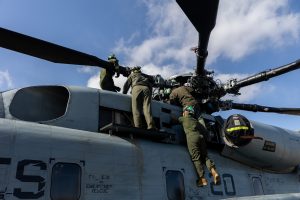Maintenance, repair, and overhaul (MRO) operations form a crucial component of military readiness and international defense partnerships. For the United States, these operations play a pivotal role in bolstering the strategic alliance with the Republic of Korea (ROK) and enhancing regional security in East Asia. U.S.-led MRO efforts contribute to strengthening the ROK-U.S. alliance, fostering interoperability, and addressing shared security challenges.
Ensuring Operational Readiness
At the core of U.S. MRO operations lies the imperative to maintain peak operational readiness of military assets. This includes aircraft, naval vessels, ground vehicles, and advanced defense systems crucial for deterrence and defense in the Asia-Pacific region. Through comprehensive maintenance programs and repair capabilities, the U.S. ensures that its own forces and those of its allies, including the ROK, are prepared to respond swiftly and effectively to any contingency or threat.
Operational readiness encompasses a broad spectrum of activities, from routine maintenance to emergency repairs. The rigorous upkeep of military equipment guarantees that assets are always in optimal condition, minimizing downtime and maximizing availability. This readiness is not only vital for immediate military engagements but also serves as a deterrent against potential adversaries. The visible preparedness of U.S. and allied forces sends a clear message of strength and resolve, thereby contributing to regional stability and security.
Fostering Interoperability and Integration
Collaborative MRO initiatives between the U.S. and South Korea are instrumental in enhancing interoperability and integration of defense capabilities. By aligning maintenance practices, sharing technical expertise, and conducting joint training exercises, the alliance strengthens its ability to operate seamlessly during combined military operations. This interoperability is essential not only for enhancing defense effectiveness but also for promoting stability and deterrence in the region.
Interoperability goes beyond just equipment compatibility; it includes standardized procedures, shared communication protocols, and coordinated operational tactics. Joint training exercises, such as the annual Foal Eagle and Ulchi Freedom Guardian drills, provide practical opportunities for U.S. and ROK forces to practice integrated operations. These exercises help identify and resolve potential gaps in coordination, ensuring that both forces can act as a cohesive unit in real-world scenarios.
Supporting Technological Advancement
Engagement in MRO activities also drives technological advancement and innovation. The exchange of best practices, technologies, and expertise between the U.S. and South Korea fosters mutual learning and continuous improvement in defense capabilities. This collaboration not only enhances equipment reliability and lifecycle management but also positions both nations at the forefront of defense technology innovation, ready to address emerging threats and challenges.
Technological collaboration can take many forms, including co-development projects, joint research initiatives, and the sharing of cutting-edge advancements. For instance, the joint development of advanced avionics systems or cyber-defense technologies can significantly enhance the capabilities of both nations’ military forces. Additionally, these technological advancements often have dual-use applications, benefiting civilian industries and contributing to broader economic growth.
Economic and Strategic Benefits
U.S.-led MRO operations in South Korea yield economic benefits by stimulating local industries, creating jobs, and enhancing technological infrastructure. Moreover, these initiatives strengthen bilateral ties and reinforce shared commitments to regional security and stability. By reducing logistical vulnerabilities and enhancing operational flexibility, the alliance mitigates risks and strengthens its strategic resilience against evolving geopolitical dynamics.
The economic impact of MRO operations is multifaceted. Local businesses involved in the defense supply chain benefit from increased demand for their products and services, leading to job creation and economic growth. Furthermore, the development of technological infrastructure supports broader industrial capabilities, contributing to national economic resilience. Strategically, the strengthened economic ties between the U.S. and South Korea reinforce the partnership, making it more robust against external pressures and internal challenges.
Challenges and Path Forward
While U.S.-led MRO operations offer substantial benefits, they are not without challenges. These include navigating regulatory environments, addressing cybersecurity concerns, managing complex logistics, and ensuring political support. Overcoming these challenges requires sustained cooperation, transparent communication, and adherence to international standards. By enhancing regulatory alignment, implementing robust cybersecurity measures, optimizing logistical coordination, and engaging in proactive political and public outreach, the U.S. and South Korea can further solidify their defense partnership and adapt to future security challenges.
Navigating regulatory environments involves harmonizing the legal frameworks of both nations to facilitate smooth operations. This includes aligning export control regulations, standardizing maintenance procedures, and ensuring compliance with international norms. Addressing cybersecurity concerns is critical, given the increasing sophistication of cyber threats. Implementing advanced cybersecurity protocols, conducting regular vulnerability assessments, and fostering information sharing between nations can mitigate these risks.
Logistical complexities, such as the transportation of parts and equipment, necessitate robust supply chain management strategies. Strategic planning and investments in infrastructure can enhance logistical efficiency, ensuring timely and effective MRO operations. Additionally, fostering political support through transparent communication and public engagement is essential for maintaining the long-term viability of MRO initiatives. Building public awareness of the benefits and importance of these operations can help secure sustained political backing.
Conclusion
U.S. efforts in maintenance, repair, and overhaul operations are pivotal for reinforcing the ROK-U.S. alliance and promoting regional security in East Asia. These initiatives not only ensure military readiness and interoperability but also foster technological innovation, economic growth, and strategic resilience. By continuing to invest in collaborative MRO programs and addressing challenges through cooperative strategies, the U.S. and South Korea reaffirm their commitment to maintaining peace, stability, and prosperity in the Asia-Pacific region for years to come.
The future of U.S.-led MRO operations holds significant potential for further strengthening global defense partnerships. As the geopolitical landscape evolves, these operations will remain a cornerstone of the U.S. strategy to maintain a robust defense posture and support its allies. Through continued investment in MRO capabilities, technological innovation, and collaborative initiatives, the US and South Korea can ensure that they are well-prepared to meet the demands of an increasingly complex global security environment. This commitment to mutual defense and shared prosperity underscores the enduring strength of the ROK-U.S. alliance and its pivotal role in maintaining regional and global stability.

































